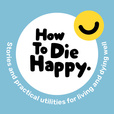
Summary: <p>Welcome to the How To Die Happy podcast, where we talk to people hell-bent on changing the world on various scales. In this episode, our hosts Matin O'Toole and Julia Malcolmson spoke to a man who's taken on one hell of a challenge.</p> <p>One of the most pressing crises facing our planet is caused by waste, particularly plastic. The Indonesian island of Bali is famous for its stunning beaches and lush green tropical countryside, but it is also grappling with a massive plastic emergency. Poor education, inconsiderate tourists, mass sales of single-use plastic, and a grave lacking waste management infrastructure have contributed to the problem, with beaches like Kuta, Seminyak, and Legian being inundated with up to 60 tonnes of plastic rubbish each day. The trash is a combination of foreign waste brought to the island by the Indian Ocean's Java Sea waves and plastic from the island itself, brought to the sea by the many rivers and tributaries.</p> <p>One example of the plastic waste problem is the dead sperm whale that washed up at an Indonesian nature reserve. An autopsy revealed that the creature's stomach contained 6kg of plastic waste, including 115 single-use Danone Aqua plastic cups.</p> <p>The pandemic has only worsened the situation, leaving tens of thousands of Balinese families desperate and starving due to the island's heavy reliance on tourism. In response, Made Janur Yasa saw an opportunity to address both issues and created the <a href="https://plasticexchange.org/" target="_blank" rel="noopener noreferer">Bali Plastic Exchange</a>. This sustainability movement empowers communities to change their waste behaviour through dignity-based exchange systems.</p> <p>Plastic Exchange invites Balinese communities to collect all types of plastic rubbish from their local area and trade it for rice. The idea is profound and simple in equal measure since Janur believes that giving people rice does not benefit the community, as it is rescuing rather than enabling. Instead, this model empowers the people of Bali to help themselves and clean up their island as a united collective. Janur's uncomplicated concept has taken flight, and Plastic Exchange has connected with over 200 villages, collected over 700,000kg of plastic, and distributed over 170,000kg of rice to families in dire need of this staple food to survive. Since its inception, Plastic Exchange has fed over 30,000 families, and while naturally in need of ongoing awareness and support, the NGO continues to grow as the word is spread.</p> <p>"Within every crisis lies an opportunity," says Made Janur Yasa, who received a CNN Hero Award in 2021 for his work. He speaks with humility, of community, and always of "we" (never "I"). Above all, Janur speaks of "action," as he believes "edu-action" trumps charity or straightforward education every day of the week. Having heard the man speak of this with such passion, we are inclined to agree.</p> <p>The How To Die Happy podcast aims to provide practical utilities and stories for living and dying well. Serving others through generosity and compassionate help is perhaps the epitome of what it means to live well, and you can hear more about this in our interview with Made Janur Yasa of the Bali Plastic Exchange.</p> --- Send in a voice message: https://podcasters.spotify.com/pod/show/howtodiehappy/message
